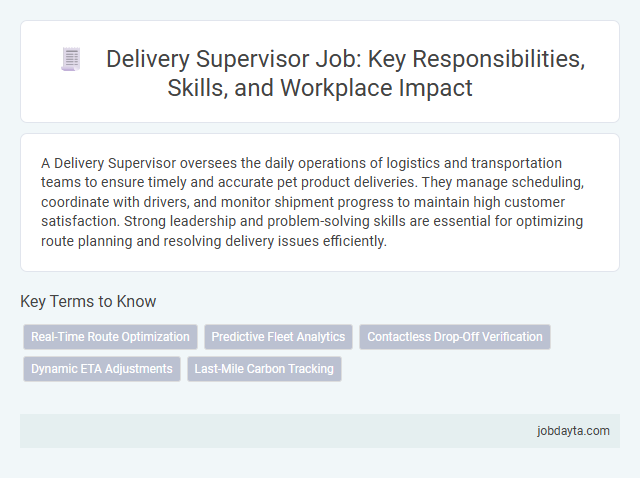A Delivery Supervisor oversees the daily operations of logistics and transportation teams to ensure timely and accurate pet product deliveries. They manage scheduling, coordinate with drivers, and monitor shipment progress to maintain high customer satisfaction. Strong leadership and problem-solving skills are essential for optimizing route planning and resolving delivery issues efficiently.
Introduction to the Delivery Supervisor Role in Logistics
The Delivery Supervisor plays a crucial role in logistics by overseeing the timely and accurate delivery of goods. This position involves coordinating with drivers, managing schedules, and ensuring compliance with safety regulations. Effective delivery supervision ensures customer satisfaction and operational efficiency in the supply chain.
Core Responsibilities of a Delivery Supervisor
The Delivery Supervisor manages and coordinates the entire delivery process to ensure timely and accurate order fulfillment. They oversee delivery schedules, monitor vehicle routes, and maintain communication with drivers to optimize efficiency.
You are responsible for supervising delivery staff, addressing operational challenges, and ensuring compliance with safety standards. The role requires tracking performance metrics, resolving customer delivery issues, and maintaining accurate delivery records.
Essential Skills Required for Delivery Supervisors
Delivery Supervisors play a critical role in managing logistics operations and ensuring timely deliveries. Mastery of specific skills enhances their ability to oversee delivery teams effectively and optimize supply chain processes.
- Leadership - Delivery Supervisors must inspire and coordinate their teams to maintain high performance and meet delivery deadlines.
- Communication Skills - Clear communication with drivers, customers, and warehouse staff ensures smooth logistics coordination and problem resolution.
- Organizational Ability - Effective scheduling and route planning reduce delays and improve overall delivery efficiency.
Managing Delivery Teams Effectively
Effective management of delivery teams ensures timely and accurate order fulfillment, directly impacting customer satisfaction. Delivery supervisors play a critical role in coordinating logistics operations and optimizing route planning.
Supervisors must monitor team performance, address challenges swiftly, and maintain clear communication channels. Prioritizing safety protocols and compliance standards is essential for reducing delivery risks. Leveraging technology tools can enhance tracking and streamline team coordination for improved productivity.
Ensuring Timely and Accurate Deliveries
The Delivery Supervisor plays a critical role in managing the logistics process to ensure timely and accurate deliveries. This position involves coordinating routes, monitoring shipment status, and resolving delivery issues efficiently.
- Route Optimization - The supervisor plans and adjusts delivery routes to maximize efficiency and reduce transit times.
- Shipment Tracking - Real-time monitoring of delivery progress helps maintain schedule adherence and improve accuracy.
- Issue Resolution - Promptly addressing delays, damages, or errors ensures consistent customer satisfaction and operational reliability.
Handling Logistics Challenges and Problem-Solving
How do Delivery Supervisors tackle unexpected logistics challenges effectively? Delivery Supervisors coordinate teams to ensure timely deliveries despite obstacles. Their problem-solving skills minimize delays and improve supply chain efficiency.
Impact of Delivery Supervisors on Customer Satisfaction
| Role | Delivery Supervisor |
|---|---|
| Primary Responsibility | Overseeing delivery operations to ensure timely and accurate order fulfillment |
| Key Impact on Customer Satisfaction |
|
| Performance Metrics Linked to Customer Satisfaction |
|
| Strategic Value | Delivery Supervisors directly influence customer loyalty and brand reputation by ensuring reliable and positive delivery experiences |
Utilizing Technology in Delivery Supervision
Leveraging advanced technology is essential for effective delivery supervision in logistics. Your ability to integrate digital tools enhances real-time tracking and operational efficiency.
- GPS Tracking Systems - These enable supervisors to monitor delivery routes and ensure timely arrivals by providing live location data.
- Delivery Management Software - This technology streamlines scheduling, dispatching, and communication between drivers and supervisors.
- Data Analytics Platforms - These tools analyze delivery performance metrics, helping identify bottlenecks and optimize processes.
Utilizing technology transforms delivery supervision into a more precise and responsive function within logistics operations.
Career Growth and Development Opportunities
Delivery Supervisors play a crucial role in managing logistics operations and ensuring timely delivery of goods. Their leadership skills and hands-on experience in route planning and team coordination are highly valued in the logistics industry.
Career growth for Delivery Supervisors includes advancement to logistics manager, operations manager, or supply chain coordinator positions. Professional development opportunities such as certifications in logistics management and advanced training in transportation technologies enhance career prospects.
Conclusion: The Strategic Importance of Delivery Supervisors in Logistics
Delivery supervisors play a critical role in ensuring timely and accurate order fulfillment, directly impacting customer satisfaction and operational efficiency. Their strategic oversight helps optimize route planning, manage workforce productivity, and maintain quality control throughout the delivery process. Effective delivery supervision drives cost reduction and enhances competitive advantage in the logistics industry.
Related Important Terms
Real-Time Route Optimization
Delivery Supervisors leverage real-time route optimization technologies to enhance fleet efficiency, reduce fuel consumption, and minimize delivery times. Advanced GPS tracking and AI-driven algorithms enable dynamic rerouting based on traffic patterns, weather conditions, and delivery priorities, ensuring timely arrivals and improved customer satisfaction.
Predictive Fleet Analytics
Delivery Supervisors utilize predictive fleet analytics to anticipate vehicle maintenance needs and optimize route efficiency, significantly reducing downtime and operational costs. Leveraging real-time data and machine learning algorithms, they enhance delivery accuracy and ensure timely shipments across large logistics networks.
Contactless Drop-Off Verification
Delivery Supervisors implement contactless drop-off verification systems to enhance safety and efficiency, using digital signatures, photo evidence, and GPS tracking to confirm parcel delivery without physical interaction. These technologies reduce delivery errors and protect both customers and drivers by minimizing contact during last-mile logistics operations.
Dynamic ETA Adjustments
Delivery Supervisors leverage real-time data analytics and GPS tracking to implement dynamic ETA adjustments that optimize route efficiency and minimize delays. This proactive approach enhances customer satisfaction by providing accurate delivery time updates and enabling swift response to unforeseen disruptions in the logistics network.
Last-Mile Carbon Tracking
Delivery Supervisors play a crucial role in last-mile carbon tracking by overseeing route optimization and real-time emissions monitoring to reduce environmental impact. Implementing advanced telematics and carbon footprint analytics enables precise measurement and reporting of delivery-related greenhouse gas emissions for sustainable logistics operations.
Delivery Supervisor Infographic

 jobdayta.com
jobdayta.com